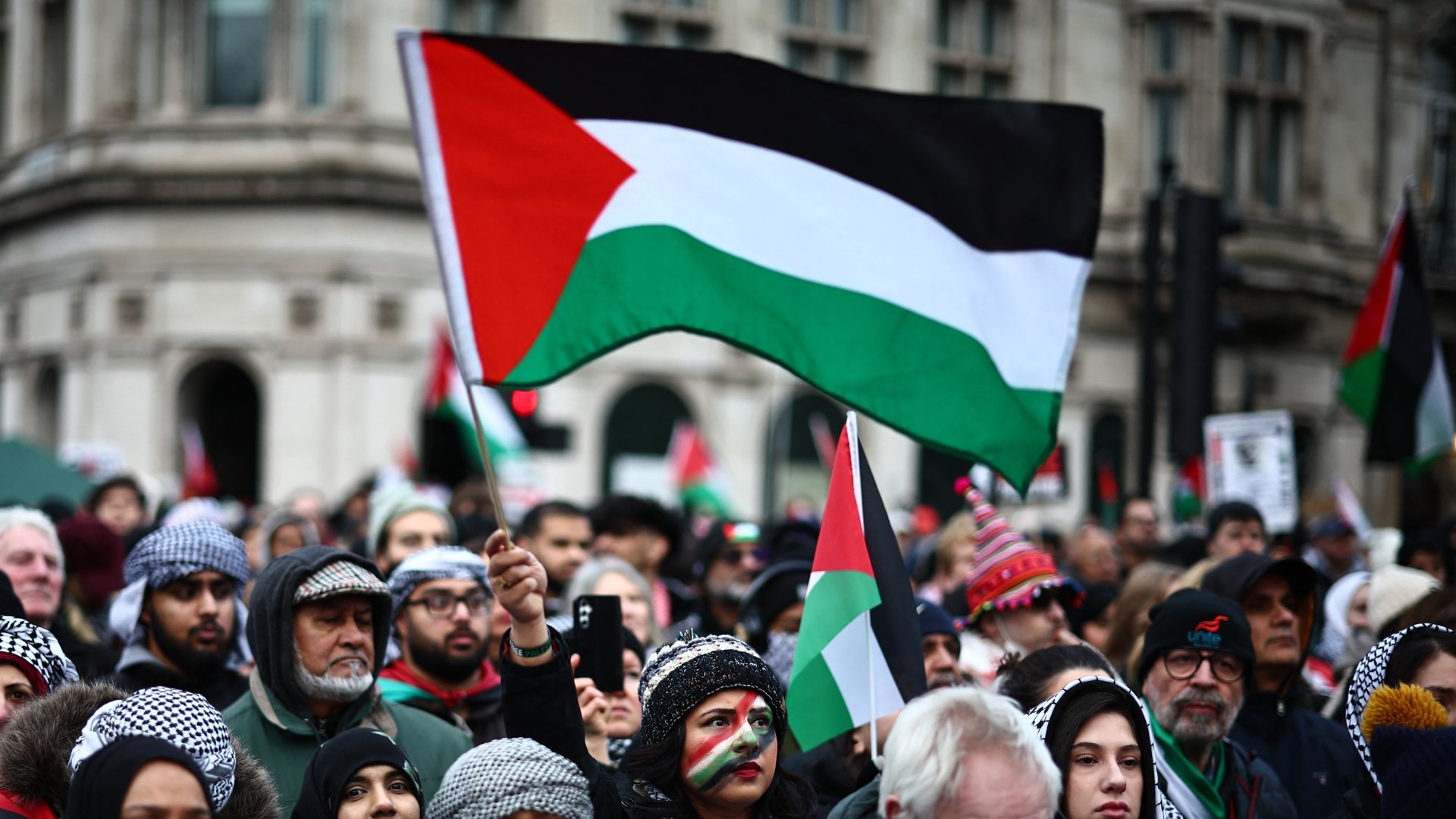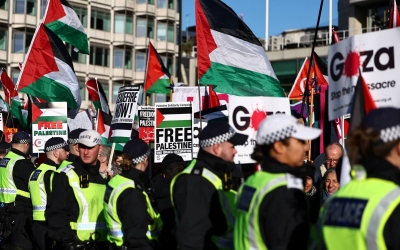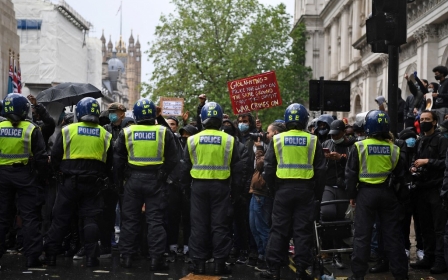UK: Gaza protest organisers say police restrictions risk public safety

Organisers of Saturday's demonstration in London in support of Palestine have accused police of putting public safety at risk by imposing new restrictions on the latest in a series of protest marches that have drawn hundreds of thousands of people onto the streets.
London's Metropolitan Police said on Thursday it had agreed to organisers' request to march down Whitehall to a stage set up close to 10 Downing Street, the British prime minister's residence.
But they refused organisers' request for a second stage in nearby Trafalgar Square, as had been permitted during previous demonstrations, and said the protest would be "subject to strict conditions".
Protest organisers welcomed the decision to allow them to march to Whitehall which they said was a "signficant victory for the right to protest".
But they criticised the decision not to allow them to use a second stage.
New MEE newsletter: Jerusalem Dispatch
Sign up to get the latest insights and analysis on Israel-Palestine, alongside Turkey Unpacked and other MEE newsletters
"We have made clear that this makes the task of ensuring public safety much more difficult," they said in a statement.
'Unfortunately the policing of the marches has become increasingly politicised and repressive over several months'
- Ben Jamal, PSC
“Those marching for justice and peace, for over three months, have had to encounter intimidation and the imposition of repressive measures, designed to suppress support for the Palestinian people’s struggle for freedom and justice. We will not allow this to stop us marching or to distract us from our central message.”
Organised by a coalition including the Palestine Solidarity Campaign (PSC), Friends of Al Aqsa, Stop the War Coalition and the Muslim Association of Britain, organisers say they expect 300,000 people to attend Saturday’s march.
Ben Jamal, who heads the PSC, told Middle East Eye that organisers had been involved in "intense and difficult negotiations" with the police ahead of the march.
"The police have now yielded to allow us to march to Whitehall, from where we will send our message to the government that it must not be complicit in Israel’s genocide in Gaza by continuing arms exports, military cooperation and diplomatic support," said Jamal.
"This is the eighth National March for Palestine and they have brought hundreds of thousands of people to the streets of London in orderly and peaceful demonstrations. Unfortunately the policing of the marches has become increasingly politicised and repressive over several months."
Jamal said a second stage would "allow for two places for people to gather and disperse from, which would help management of the event for all concerned.
"We will do everything in our power to ensure the march is as successful and effective as every previous one."
Asked for comment, the Metropolitan Police referred MEE to comments posted on its X social media platform attributed to Deputy Assistant Commissioner David Ward.
“The Palestine Solidarity Campaign originally asked for a second stage - one in Trafalgar Square and another in Whitehall. This would have caused serious disruption and was not supported,” said Ward.
“To avoid Trafalgar Square becoming too full, we have agreed to just one stage for speakers in Whitehall.”
Hundreds of thousands have attended regular protests calling on the UK government to support a ceasefire since Israel began its bombardment of Gaza following Hamas's attacks in southern Israel on 7 October 2023. More than 27,000 people have been killed in Gaza since the conflict began.
Organisers have complained that the police have faced pressure from the government and pro-Israeli groups to restrict the marches and stop them from taking place.
Last month, MEE revealed that the UK’s antisemitism monitor, the Community Security Trust, had been inside the police’s special operations room during previous pro-Palestine marches.
A police spokesperson told MEE on Friday that the CST would not be in the control room for this Saturday's march.
Organisers say the marches have been peaceful and inclusive events attended by hundreds of thousands of people, and point to the presence among attendees of a large Jewish bloc and speakers from Jewish organisations which support calls for a ceasefire and Palestinian rights.
Last month, the Metropolitan Police said it had made more than 400 arrests and had launched around 30 counter-terrorism-led investigations into suspected offences at protests in London and had set up “a dedicated taskforce... to identify terrorism offences linked to protests”.
Asked what the current figure was for the number of arrests linked to protests, a police spokesperson said: "We don't have a running total I'm afraid."
Middle East Eye delivers independent and unrivalled coverage and analysis of the Middle East, North Africa and beyond. To learn more about republishing this content and the associated fees, please fill out this form. More about MEE can be found here.





